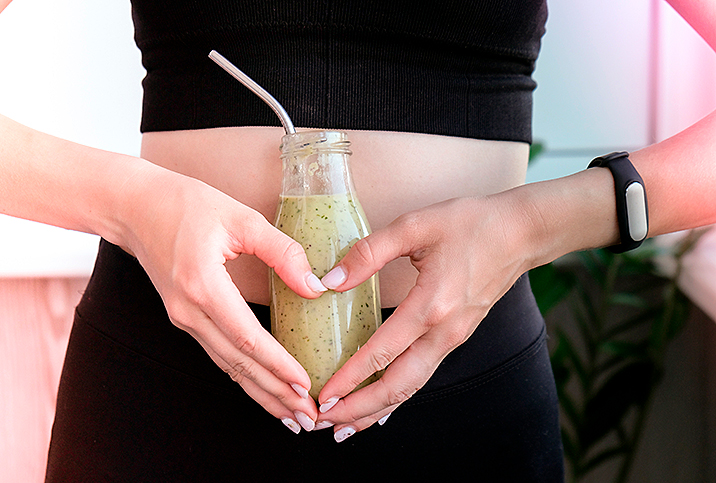Foods Rich in Omega-3s Might Help With Menstrual Health

Menstrual health is complex. The 28-day cycle often touted as normal is really just an average and isn't what many menstruators experience.
Your menstrual cycle constantly changes, not only between months but also as you age, fluctuate in weight or go through times of stress. While many of these changes are normal, sometimes they aren't. Many people who menstruate experience symptoms including mood disturbances, cramping, missed periods, heavy bleeding and more.
Nutrition is one way people can take back some control of their cycle and symptoms. Although many people need more than just a single nutrient or lifestyle change to address their symptoms, promising research indicates that omega-3 fatty acids are one of the most effective nutrients for supporting menstrual health. This fatty acid has been suggested to improve premenstrual syndrome (PMS) and mood disturbances caused by fluctuating hormones.
Omega-3 supports hormone production and balance
The menstrual cycle is divided into phases beginning and ending with menstruation. Ovulation occurs in the middle, with the follicular and luteal phases on either side. The defined standard length of a cycle is 25 to 35 days and is typically determined by when you ovulate.
As you get older, cycle length becomes shorter than the clinical median of 28 days, and the time of ovulation is earlier in the cycle. This shortening continues until menopause, when menstruation and ovulation stop. Other influencing factors include ethnicity, high body mass index (BMI), stress and lifestyle habits.
Underlying all of this is the resulting impact on hormones. Female hormonal balance is sensitive due to millions of years of evolution striving to optimize reproduction. When environmental cues signal to your body that you are stressed or malnourished, for instance, hormones can be suppressed, effectively diminishing or preventing reproduction.
'Omega-3 are fatty acids that help support the production of estrogen and progesterone since both of these hormones need fats to be produced by the body.'
Supporting your hormonal balance with nutrition can help.
"Omega-3 are fatty acids that help support the production of estrogen and progesterone since both of these hormones need fats to be produced by the body," said Lahana Vigliano, a certified clinical nutritionist and the CEO of Nuvitru Wellness, an Austin, Texas, company that focuses on helping women overcome hormonal imbalances.
Producing the correct amount of estrogen and progesterone helps keep your cycles ticking along as expected and reduces the undesirable side effects during high hormone fluctuations of your cycle.
"Painful periods can result from having too many prostaglandins, which are fats derived from arachidonic acid [omega-6] that have similar hormone effects. The purpose of prostaglandins is to help the uterus shed the lining. Omega-3 can help balance out the fatty acid ratio, reduce excess prostaglandins and calm painful PMS that results from it," Vigliano said.
Omega-3 is anti-inflammatory
"Omega-3 fatty acids can have anti-inflammatory effects, which may help with menstrual pain," explained Lauren Manaker, a registered dietitian, nutritionist and author in Charleston, South Carolina.
Increasing your intake of omega-3s can balance pro-inflammatory omega-6, which researchers believe contributes to pain and cramping in the premenstrual phase.
Omega-3 supplements have been suggested to more effectively reduce premenstrual back and abdominal pain than a placebo. However, the effect is mild and decreases with both age and increasing doses of omega-3, according to a 2022 meta-analysis published in the European Journal of Clinical Pharmacology.
Omega-3 fatty acids support mood and brain health
Your brain, the center of your nervous system, is particularly rich in polyunsaturated fatty acids, including omega-3s. Consuming more of them in your diet could have neuroprotective effects.
These omegas may also support mood changes, including depression, nervousness, anxiety and difficulty concentrating, that can occur before and during menstruation, Manaker said.
Some studies support taking omega-3 to reduce the severity and duration of depression, anxiety and trouble concentrating. However, other studies show no efficacy of omega-3s against depression, according to a 2015 review of the evidence published in the journal Integrative Medicine Research. It's important to remember that depression is often multifactorial, so while some people suffering from depression may benefit from taking omega-3 supplements, others may not.
How to get more omega-3 fatty acids
You cannot synthesize omega fats, so getting them through your diet or supplements are the only ways to ensure you get enough. Plus, they are considered essential, meaning your body needs them to function properly.
"Eating food like oily fish, avocado, walnut[s] and chia seeds can give your body a boost of omega-3 fatty acids," Manaker said.
Your best bet is to consume seafood regularly. There are three types of omega-3s: alpha-linolenic acids (ALAs), which are found in plant foods, and eicosapentaenoic acid (EPA) and docosahexaenoic acid (DHA), both of which are found in fish and seafood. Your body has to convert the ALA in plant foods in order to be used properly in the body, and unfortunately, conversion is inefficient. For this reason, seafood is the best source of omega-3 fatty acids.
"Wild-caught seafood is some of the best bioavailable sources of omega-3. If the taste of seafood turns you away, you can use supplementation, but it's important to know and trust the supplement company you purchase from to avoid rancid fatty acids," Vigliano advised.
She recommended a high-quality source of omega-3 and fat-soluble vitamins, such as vitamin A, which can be found in cod liver oil.
When to see a doctor about your menstrual health
You should always visit a doctor for regular checkups that include discussions about your menstrual health. If anything is abnormal or concerning, bring it up at your appointment.
"Women should see a doctor when painful PMS is impacting their day-to-day life, but they shouldn't stop there. It's important to partner up with other health professionals, like clinical nutritionists or dietitians, to change things in diet and lifestyle that can also contribute to hormonal health," Vigliano said.
Editor's note: These statements have not been evaluated by the Food and Drug Administration. Our medical experts advise that you consult with your primary healthcare provider before you begin using a supplement. This information is not intended to diagnose, treat, cure or prevent disease.


















